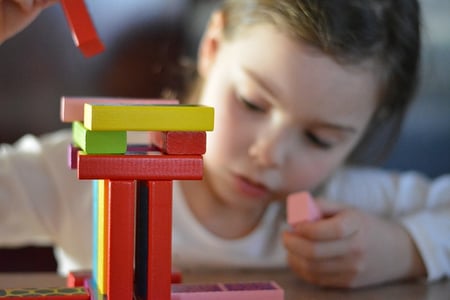
Young children are naturals at analysis and reasoning. They want to understand. They want to solve problems, experiment, and compare. And we can help them!
First, let’s look at what Analysis and Reasoning means. To analyze is to look closely or examine; reason means to form conclusions or inferences based on what we know or experience. Every time preschoolers ask questions, predict, classify, compare, or evaluate, they practice analysis and reasoning skills.
Children need adults to practice many of these thinking exercises at a deep level. It is not enough to ask a single prediction question. What matters most are the back-and-forth exchanges that follow an activity—how a educator keeps challenging and supporting children.
We can promote higher-order thinking through analysis and reasoning in everyday tasks, not just during a science experiment. Below are just a few "starter questions.” Then it’s your turn to seek inspiration from other CLASS® dimensions as you consider how to respond to children to keep the thinking going.
Playing with Blocks:
- Problem-solving: Can you fix the ramp with these blocks? What other materials might you need? I want to build a bridge; how can I do that?
- Prediction/experimentation: My tower keeps falling! How many blocks can you add before it falls? What will happen if I pull this block out?
- Classification/comparison: Do you have more blocks in your tower than mine? How do you know?
- Evaluation: Were you able to fix the ramp? How did you figure that out?
On a Nature Walk:
- Why/how questions: This flower pricked me! Why does it have thorns? How is that like an animal’s teeth?
- Problem-solving: You want to carry all those rocks, but they keep falling. It seems like you have too many to fit in your hands. What solution could we come up with? What else might work?
- Prediction/experimentation: I wonder how many rocks could fit in this cup. What do you think? Why do you think that?
- Classification/comparison: How are these two leaves different? Can you find another leaf with a stem like this?
Prepping Snack:
- Why/how questions: Why do these strawberries have stems?
- Problem-solving: We don’t eat the stem. What can we do with it? What else can we try?
- Classification/comparison: I like raspberries. How are strawberries and raspberries alike? How are they different? Can you find the biggest strawberry?
Reading a Book:
- Why/how questions: How do you think the story will end? Why do you think the character is sad?
- Problem-solving: The animals are fighting. How could they solve their problem? Why might that work?
- Prediction/experimentation: What do you think she will do next? Let’s record our predictions so we can remember at the end of the book.
- Evaluation: What did you think of the book? What was your favorite part?
The ability to think critically allows us to gain a deeper understanding of concepts. How else do you bring Analysis and Reasoning into your classroom?

